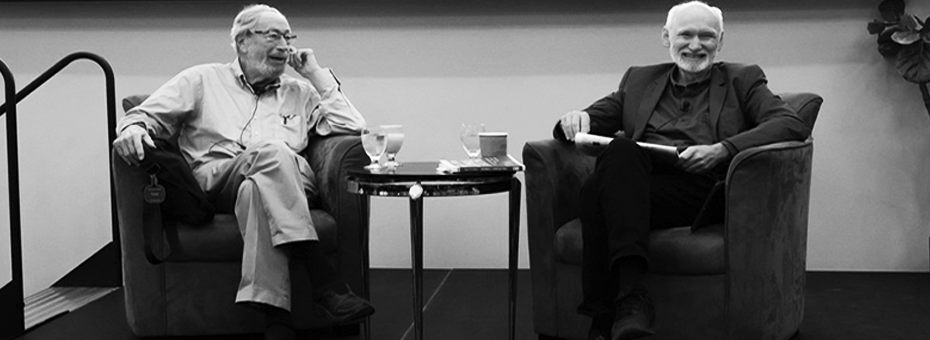For the past two years, I have enjoyed the honor of engaging in an on-stage dialogue with the great Edgar Schein. The occasion? The Lean Healthcare Academic Conference at Stanford. Prof Schein and I will join the seminal event again this year for round three, in Palo Alto October 8-9.
Professor Schein, collaborating with a handful of other pioneers orbiting mainly around MIT, virtually invented the modern field of OD, Organizational Development. His book Organizational Psychology was first released in 1965 and is still the go-to reference for OD academicians and practitioners alike. In more recent years, neuroscience gets the headlines but remains of limited practical use without nesting in the groundbreaking work in social and organizational psychology of Prof Schein.
For me personally, conversations with Professor Schein are stimulating and enlightening. Professor Schein will turn 90 years young this year. He is still busy writing books and remains a cutting-edge thinker bring new ideas and leading the conversation about what matters in this field. His book Humble Consulting was released last year and he is on the verge of publishing yet another follow up, Humble Leadership, (which will be released next month.)
Our 2016 dialogue, moderated by then COO of Stanford Medical Center James Hereford, focused on parsing the unique demands, if any, of the healthcare environment vis a vis organizational change in general (or lean thinking and practice in particular). The 2017 dialogue/debate, moderated by Stanford Children’s Hospital Senior Lean Coach Denise Bennett, focused on deeper questions of the importance of relationships in situations of influencing change without authority.
You can read a slightly abridged version of the full 2017 dialogue by clicking here for access to the complete pdf.
For me, reviewing the transcript has been instructive as I prepare for Round Three with Edgar in Palo Alto in October, but also as I prepare for our annual Lean Coaching Summit (in Seattle July 18-19). We adopted Prof Schein’s taxonomy of question types for A3 lean coaching shortly after he first introduced it with his book Helping in 2009. An objective of the Coaching Summit is not to merely teach what we already know (although we do some of that), but to explore and progress the practice. I hope you see you there to aid in that endeavor. Bring your questions and contributions; I hope this transcript of my dialogue with Edgar will aid you in your preparation as well as it has me.
John Shook
Chairman
Lean Enterprise Institute
Lean Global Network
PS: Here’s one excerpt from the dialogue:
Focusing on Task Compliance or Outcome?
“We want individuals to own outcomes not just the tasks. And that way they can truly own the tasks and how they are combined to then create outcomes that they want. So, as opposed to accountability for task, which leads to compliance mentality, we seek responsibility for outcomes.
“So, Toyota again. Even on something that is as repetitive and task oriented as working on an assembly line, it is possible to change focus from task compliance to outcome. The fact that you can take work of that sort, which is usually considered to be among the most disrespectful to humans in the history of work, and you make it work that is respectful for people. The key thing is to give people responsibility not just for the task that’s been given them, but the outcome they produce. The definition of that outcome, then, best begins with quality and safety. So you are responsible for an outcome that is perfect. In the case of an auto assembly line, you have 60 seconds to do your work. I’m going to hold you accountable not just for doing the tasks as quickly as you can. I’m going to ask you to be responsible for the perfect outcome of zero defects, of zero safety concerns. Then a person can actually own how, over time, how to make improvements—not just random improvements of apparent efficiencies, but rather improvement of the process that leads to the perfect outcome. I think this confusion, the confusion between doing a task for compliance versus understanding its purpose or reason why, gets in the way of almost everything we do in organizational improvement programs.”






